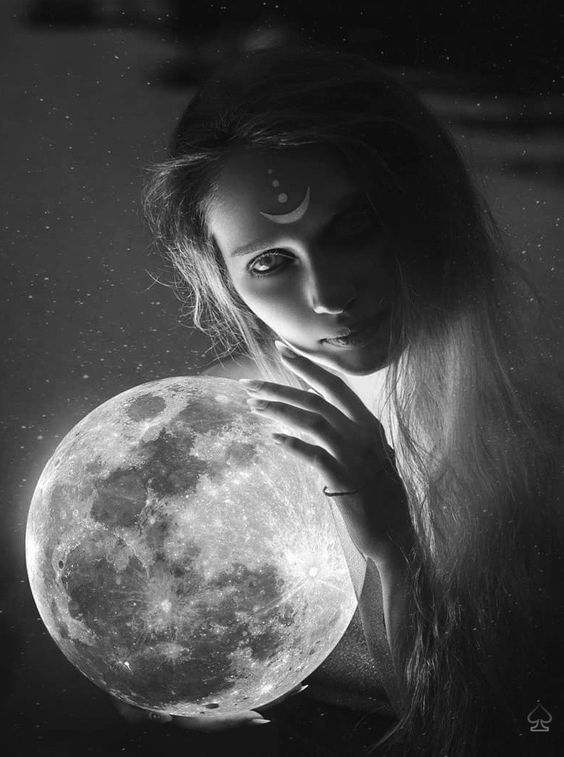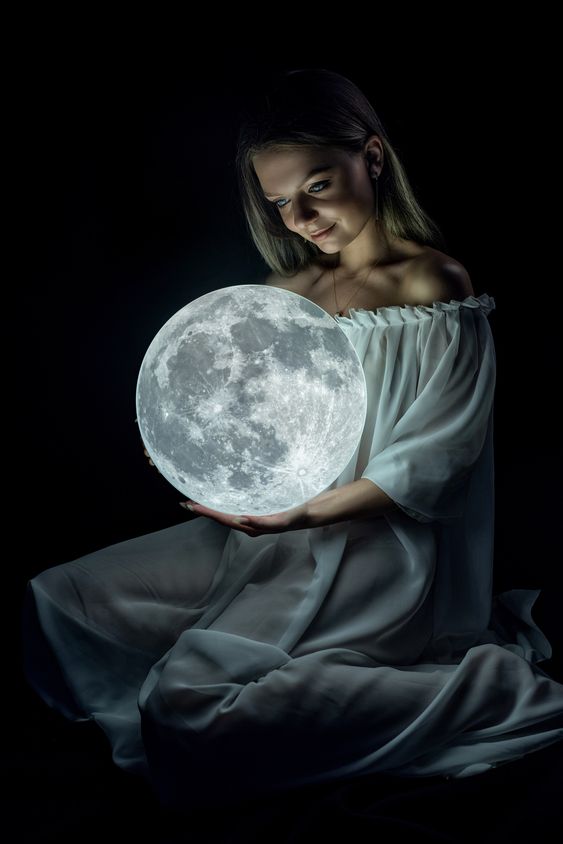 In astrology, the Moon holds a significant role in shaping our emotional landscape and influencing our instinctual reactions. The house placement of the Moon in an individual’s natal chart provides valuable insights into the specific areas of life where emotional needs, nurturing instincts, and the desire for support are expressed. This lunar placement signifies the lens through which we filter our experiences, form attachments, and establish a sense of security. The house placement of the Moon indicates the particular life domain in which these emotional needs are most prominent.
In astrology, the Moon holds a significant role in shaping our emotional landscape and influencing our instinctual reactions. The house placement of the Moon in an individual’s natal chart provides valuable insights into the specific areas of life where emotional needs, nurturing instincts, and the desire for support are expressed. This lunar placement signifies the lens through which we filter our experiences, form attachments, and establish a sense of security. The house placement of the Moon indicates the particular life domain in which these emotional needs are most prominent.
The Moon is inherently reactive and sensitive, mirroring the waxing and waning cycles it undergoes in the night sky. Similarly, in the astrological chart, the Moon symbolizes our ever-changing emotional responses and the ebb and flow of our inner world. As a result, the house placement of the Moon becomes a focal point for understanding how an individual navigates and expresses their emotions within the context of specific life areas. Moreover, the “deep, unconscious need” of this planetary body suggests that the lunar influence operates on a subconscious level, influencing our emotional responses without us always being fully aware of it.
Individuals with the Moon in the 4th house in their natal chart place a significant emphasis on matters related to home, family, and emotional security. The 4th house is traditionally associated with the home environment, one’s roots, and the foundation upon which an individual builds their life. When the Moon, representing emotions and nurturing instincts, resides in this house, it intensifies the importance of these themes in the person’s life. The strong hunger for emotional security suggests that individuals with this placement seek comfort and stability in their personal and domestic spheres. Home and family become sources of nourishment and emotional fulfillment.
The person feels a powerful draw to their living space, and the idea of home is not merely a physical space but a sanctuary for their emotional well-being. Any upheaval or disruption in their home environment can be profoundly distressing, causing them to suffer deeply if they are uprooted or face instability in their domestic life. The unconscious connection to roots is a significant aspect of this placement. The individual’s sense of self is intricately tied to their family history, cultural background, and ancestral heritage. The unconscious memories and emotional imprints from the past, especially early childhood, hold a profound influence on their present emotional experiences and reactions.
The personal father, often symbolized by this house in astrology, becomes a key figure in the individual’s life, acting as a hook or anchor. The relationship with the father, or the memory of the father, can deeply influence the person’s emotional well-being and sense of security. The emotional bond with the father is a significant aspect of this placement. The father figure may be perceived as emotionally invested, protective, and nurturing, creating a strong foundation for the individual’s sense of security. However, the emotional nature of the Moon can also introduce elements of instability or moodiness in the father’s character, making the emotional atmosphere at home somewhat unpredictable or subject to fluctuations. Symbolically, the Moon in the 4th house represents a soulful spirit with a deep feeling connection to the concept of home, not only as a physical space but as a metaphor for belonging and emotional security. This connection extends beyond the personal realm to a broader sense of patriotism or a feeling of connection to one’s nation. The individual may have a strong sense of identity rooted in cultural and national values.
The Moon’s placement in the 4th house deeply anchors the personality in the family of origin and connects the individual to their ancestral pool. This strong bond with the land and heritage is not only felt emotionally but also manifests as a genuine interest in investigating family history and genealogy. The person may feel a profound connection to their roots, seeking to understand the lineage and cultural background that shapes their identity. Childhood experiences play a pivotal role in shaping the personality of someone with this Moon placement in their natal chart. The emotional imprints from early family life become ingrained in their psyche, influencing their emotional responses and behaviors in adulthood. Positive and nurturing experiences with the parents contribute to a sense of safety and security, while challenging experiences may intensify the individual’s deep-seated need for emotional stability.
This individual may actively engage in exploring and preserving family traditions, rituals, and stories, valuing the continuity of these aspects across generations. The desire to maintain a connection with the past is not only a personal preference but a source of emotional sustenance. The strong need for safety and security is a recurring theme for those with the Moon in the 4th house. This need is often rooted in the experiences and dynamics within the family of origin. Whether through a stable and nurturing environment or through challenges and disruptions, the early family life plays a crucial role in shaping the individual’s perception of what constitutes emotional security. In seeking emotional stability, individuals with this placement may exhibit caretaking behaviors, not only for themselves but also for those they consider part of their extended family or close circle. The home becomes a haven where they can retreat to find solace and recharge their emotional energy.
The Moon’s placement in the 4th house not only signifies a strong emotional connection to the home and family but also suggests a residence that is constantly undergoing change. The individual with this placement may experience a series of shifts and transformations in their living situation, whether it be changes in physical residences, renovations, or fluctuations in the emotional atmosphere within the home. The Moon, as the mother image in astrology, is often associated with the females of the family, including the mother, aunts, sisters, and the maternal lineage. The emotional ties with these female figures are profound, and the individual may find a source of emotional support, understanding, and guidance in these relationships. If favorable aspects are present in the chart, there may be potential benefits or blessings that come through these female connections. This could manifest as inheritances, both emotional and material, that contribute to the individual’s well-being and sense of security.
The lunar influence on the 4th house underscores the significance of the home as a place of emotional refuge and nourishment. The person may actively seek to create a home environment that provides comfort and emotional security, even amidst the changing circumstances that may be a recurring theme in their life.
The Moon’s placement in the 4th house suggests that ties to the early childhood home and parents continue to play a crucial role even in the individual’s adult life. The emotional bonds forged during formative years remain strong, and as a result, the person may find themselves emotionally connected to their family of origin well into adulthood. This emotional tie can sometimes lead to a degree of emotional dependency on others, as the individual instinctively seeks the familiarity and security associated with their early home life. The instinctive search for emotional security and intimacy becomes a dominant theme in the person’s life. The need for a deep, emotional connection is a driving force, and they may actively seek out relationships and environments that provide a sense of safety and nurturing. This can manifest as a strong desire for close, supportive relationships where emotional needs are met.
The individual with the Moon in the 4th house has a profound need to feel a sense of belonging. They find security in a tight-knit community, whether it be with family, close friends, or a partner. This sense of belonging is closely tied to their past and its origins, reflecting a desire to maintain continuity and connection with their roots. Privacy holds particular importance for those with the Moon in this placement. The home, being a sanctuary for their emotions, is a place where they can retreat and recharge. They value their personal space and may feel emotionally affected by the environment around them. The atmosphere and energy of their living space can influence their moods, and they may actively seek to create a home environment that provides comfort and emotional well-being.
Individuals with the Moon in the 4th house typically feel a sense of ease and comfort in their immediate family environment. The home and family serve as a refuge, providing a familiar and secure space where they can be themselves and express their emotions freely. However, despite the comfort they find within the family, there can be challenges associated with this placement. The main struggle often revolves around issues of insecurity, moodiness, and defensive emotions. The Moon, as a symbol of emotions, tends to amplify these feelings, making the individual more susceptible to emotional fluctuations and reactions. They may experience mood swings and defensive tendencies, especially when they perceive a threat to their emotional security.
The nesting instinct is strong in individuals with the Moon in the 4th house. This means they have a deep desire to create a nurturing and protective home environment. The need to withdraw back home is pronounced, particularly when facing difficulties or challenges in the external world. Returning to the safety of their home is a coping mechanism, providing them with a sense of shelter and a space where they can regroup emotionally. In times of stress or uncertainty, the individual may display a heightened need for the comfort and safety of their home and family. This retreat serves as a way to recharge their emotional batteries and find solace. Understanding and addressing their emotional needs become essential in managing the inherent moodiness and defensiveness associated with this placement.
Overall, while the Moon in the 4th house brings a strong sense of ease within the family environment, it also brings challenges related to emotional security. Nurturing a supportive home environment and finding healthy outlets for emotional expression are crucial for individuals with this placement to navigate their emotional landscape effectively.



